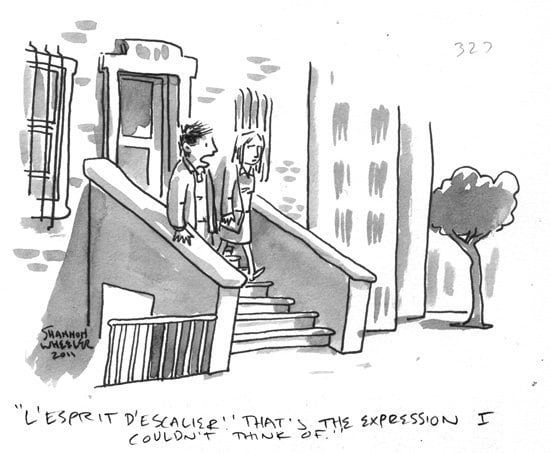There Is No Such Thing as an Untranslatable Word
What do the French mean by esprit de l’escalier? It can easily be explained, writes linguist Marten van der Meulen. That’s why he finds it odd that this expression often appears in lists of “untranslatable words”. Surely those kinds of words do not actually exist?
They are part of the warm weather and the summer. Like the invisible mosquitoes that plague you at night, like the particular headache you get from an afternoon of drinking lukewarm wine in the sun, like the sand that nestles itself between your toes for weeks after a beach visit.
Lists of untranslatable words.
In addition to articles on etymology, these lists are perhaps the most popular example of Language for the Great Mass of People. Try it for yourself by typing “untranslatable words” in your search engine, and you’ll get dozens, if not hundreds, of lists. A lot of the lists have a sense of astonishment (which is nice, amid all the sad whining about supposed language errors). The titles contain words like magic, awesome, favourite, beautiful
and impossible sweetness. And let’s face it: the words have an enormous appeal to our imagination. An Arabic word for a compromise where everyone wins. A Japanese word for sunlight shining through the leaves. A Swedish word for a socially mandatory break to drink coffee.
My favourite example of an “untranslatable word” is probably esprit de l’escalier. I even remember when I first consciously realized this, even though I wasn’t familiar with the word at the time. At the end of primary school, I went to a nature camp several times. A wonderful stay in Zeeland or on the Veluwe. The third time I went, a staff member of the camp joined one evening. She greeted us and recognized a few children. I had already met her during an earlier camp, but she didn’t recognize me, not even when I briefly talked to her. I couldn’t think of anything to make her remember me. Only when she had left, I thought of something: I should have referred to the time I fell out of bed. It had been a violent moment, maybe I even had a bad nosebleed. But she was already gone. That feeling, that you suddenly know what to say right after it’s too late, that is esprit de l’escalier.

© Shannon Wheeler
As beautiful as they are, there are linguistic criticisms of the so-called untranslatable words. Let’s start with the most important thing: they are actually not untranslatable at all. Take the word jaysus from Bahasa Indonesia (which can be found in this list). It says the following: “An unfunny joke that’s told so badly that you actually laugh.” But…that is a translation, no? Or take the next word on that same list: the Japanese kyoikumama. This one says: “A mother who pushes her children to achieve academically.” Again, it is a translation. I could also effortlessly explain the meaning of esprit de l’escalier above. Importantly, these are not exceptions. Every supposedly untranslatable word on every list can be translated.
So, it seems that “untranslatable” does not mean untranslatable at all. All words (or at least the vast majority) can absolutely be translated. It’s just that in other languages, there isn’t one specific word that exactly covers the meaning. You have to describe the word. In linguistic jargon, you would say that the supposedly untranslatable words have not been lexicalized. That’s also interesting, but a whole different story. So untranslatable is contradictory.
Now these kinds of seemingly contradictory descriptions of words that mean something different are common. The best-known example is the phrase “good scrabble word”. People use this phrase to describe words like parkeerapparatuurplaats
(a spot for parking where you need to pay parking fees by using parking equipment), arbeidsongeschiktheidsverzekering
(insurance against injury at work and occupational disease), nachtmerriescenario
(nightmare scenario) and seksismediscussiemoe
(tired of conversations and discussions on sexism). The problem is that these are not good scrabble words at all! They are often far too long, made up of letters with little value, or impossible to play. Yet they are referred to as good scrabble words. Again, people mean something else than the literal interpretation of the word. In this context, “good scrabble word” actually means “long composition with many separate parts”.

© Thomas Bormans / Unsplash
Another problem with the so-called untranslatable words is that they are not just random words, such as articles and prepositions. Those are difficult to translate: the Dutch aan and op are not compatible with the English on, not to mention other less related languages. No, it’s often about certain feelings, and certain phenomena, which are often linked to cultural stereotypes. As a result, this “astonishment” gets an unpleasant connotation. It becomes a bit like “well, look at them over there being all weird and different”. That’s not only problematic, but also nonsensical. Again: just because we don’t have a specific word, doesn’t mean we don’t know the phenomenon. Obviously, we’re also familiar with sunshine that shines through the trees (komorebi in Japanese). And everyone recognizes esprit de l’escalier as well. It doesn’t say much that other cultures have a specific word for something and we don’t.
At the same time, there is something in that untranslatability. True untranslatability does exist, but it is about something else. It refers to precisely conveying a feeling, a context, with cultural background and all. Take swear words. You can often give a literal translation, but the meaning will certainly be different. A perfect example comes from the series After Life featuring Ricky Gervais. It’s about an English man who tries to keep going after his wife passed away. At some point in the series, he calls someone a snot-curdling
cunt. This is translated as snot-snorkende sul. They did a great job with snot-snorkend (snot-snoring), although I would have gone for snot-gorgelend (snot-gargling) but ok. However, translating cunt with sul (dork) doesn’t make any sense. It is not a literal translation (cunt literally means pussy), and in terms of connotation, the silly sul
does not come close to the bad cunt. This shows how difficult it is to grasp such a term.
Such a curse word demonstrates that translating is indeed a profession, and that it is difficult to find the correct terminology. Therefore, we should have great respect and admiration for translators. But we should absolutely not have this for these superficial lists of supposedly untranslatable words.









